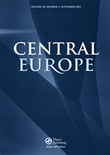
Central Europe
Scope & Guideline
Connecting Scholars to Central Europe's Complex Dynamics
Introduction
Aims and Scopes
- Historical Narratives and Memory Studies:
The journal frequently publishes works that examine the historical narratives surrounding Central and Eastern Europe, particularly focusing on the legacies of communism, nationalism, and memory politics. - Literary Analysis and Cultural Critique:
It features analyses of literature as a medium to reflect societal changes, addressing how fiction and artistic expression respond to historical trauma and political upheavals in the region. - Political and Social Transformations:
Research often investigates the political evolution and social policies in post-communist societies, including family planning, state-building, and the role of ideologies in shaping national identities. - Interdisciplinary Approaches:
The journal encourages interdisciplinary research that combines history, literature, sociology, and political science to provide comprehensive insights into Central European issues. - Focus on Regional Identity and Geopolitics:
Scholarly works often address the geopolitical context of Central Europe, examining how regional identities are constructed and contested in the face of broader European and global dynamics.
Trending and Emerging
- Post-Communist Literature and Trauma:
There is a growing emphasis on literature that addresses the traumas of post-communism, exploring how contemporary authors engage with the past and its implications for identity and social cohesion. - Family and Gender Policies in Transition:
Recent publications increasingly analyze family planning and gender policies in post-war and post-communist contexts, reflecting ongoing societal debates about family structures and state intervention. - Digital Nationalism and Public Memory:
Emerging studies explore the role of digital platforms in shaping national identities and public memory, particularly through comparative analyses of historical narratives in online spaces. - Responses to Current Conflicts:
The journal has begun to reflect more on contemporary geopolitical issues, particularly in light of recent events in Ukraine, showcasing a shift towards examining current conflicts and their historical underpinnings. - Cultural Representations of National Identities:
There is an increasing interest in how cultural productions, particularly literature and visual arts, represent and negotiate national identities in the context of globalization and regional integration.
Declining or Waning
- Early Nineteenth Century Polish Studies:
The focus on the early nineteenth century, particularly Polish radical debates and the Eastern Question, has diminished, suggesting a shift toward more contemporary issues and narratives. - Queer Studies from a Historical Perspective:
While queer studies had a significant presence in earlier publications, recent issues show a decline in works specifically addressing historical queer identities and movements, indicating a possible pivot to contemporary LGBTQ+ issues. - Microhistorical Approaches to Specific Events:
Although microhistorical analyses were previously emphasized, such as the detailed studies of specific revolutions or social movements, these have become less frequent in favor of broader thematic explorations. - Studies of Imperial Austria:
Research focused on the imperial context of Austria, particularly in relation to education and social systems, appears to be waning, possibly as the journal broadens its scope to encompass more contemporary issues.
Similar Journals
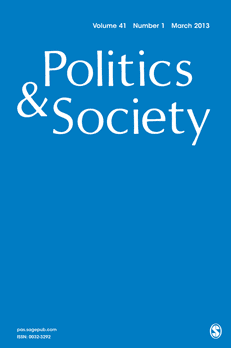
POLITICS & SOCIETY
Illuminating the complexities of political science and sociology.POLITICS & SOCIETY is a premier journal published by SAGE Publications Inc, dedicated to advancing scholarly discourse in the fields of political science, sociology, and international relations. Established in the early 1970s, it has garnered a strong reputation, reflected in its esteemed Q1 rankings across multiple categories, including Political Science and International Relations, as well as Sociology. With a significant emphasis on interdisciplinary approaches, the journal publishes innovative research that explores the complex interplay of politics and societal dynamics globally. Researchers aiming to publish high-quality articles will appreciate the journal's rigorous peer-review process and its commitment to theoretical and empirical excellence. Although not an open-access journal, it ensures wide accessibility through various institutional subscriptions. As the landscape of political and social studies evolves, POLITICS & SOCIETY remains at the forefront, making vital contributions to our understanding of the pressing issues that shape contemporary society.
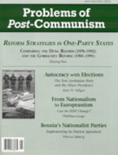
PROBLEMS OF POST-COMMUNISM
Illuminating the Pathways of Political ChangePROBLEMS OF POST-COMMUNISM is a distinguished academic journal focused on the critical examination of political, social, and economic transformations in post-communist societies. Published by Routledge Journals, Taylor & Francis Ltd, this journal features an ISSN of 1075-8216 and an E-ISSN of 1557-783X. With an impressive ranking of Q2 in the fields of Sociology and Political Science, and a Scopus position of #290/1466 (80th percentile), it stands as a vital resource for researchers and practitioners alike. The journal spans a convergence of years from 1996 to 2024, offering a rich archive of scholarship. Although it does not currently provide open access options, its rigorous peer-reviewed articles delve into the intricate dynamics shaping post-communist states, making significant contributions to contemporary academic discourse. Addressed to an audience keen on understanding the societal shifts and challenges facing these regions, PROBLEMS OF POST-COMMUNISM is essential for anyone seeking insightful analyses and robust dialogue in this evolving field.

East Central Europe
Bridging Past and Present in Cultural StudiesEast Central Europe is a prestigious scholarly journal published by BRILL that focuses on the intricate historical and cultural landscapes of the East Central European region. Established in 1975, this journal has become a pivotal platform for scholars, professionals, and students engaged in the fields of Cultural Studies, History, and Sociology and Political Science. With its comprehensive scope that spans significant historical periods and contemporary issues, East Central Europe aims to foster a deeper understanding of the socio-political dynamics and cultural developments that define this diverse area. Although not open access, the journal maintains a respectable impact within its category, ranking Q3 in both Cultural Studies and History, highlighting its relevance and reach within the academic community. Researchers interested in deepening their insights into regional studies will find this journal an invaluable resource, reflecting its solid position within the academic hierarchy, as evidenced by its ranking in Scopus. Further information and submission details can be accessed through BRILL's official website.

New Perspectives
Illuminating new paths in political theory and international discourse.New Perspectives is a pivotal academic journal published by SAGE Publications Inc, dedicated to advancing the fields of Political Science and International Relations. With a focus on innovative research and critical analysis, it has established a notable presence since its inception in 2015, currently holding a Q3 ranking in its category for 2023. Based in the Czech Republic, New Perspectives has a robust Scopus rank of #292 out of 706, placing it in the 58th percentile among social science journals. This underscores its significance in fostering scholarly dialogue and presenting fresh ideas in a rapidly evolving global landscape. While not open access, the journal attracts a diverse readership, including researchers, professionals, and students who are keen on exploring emerging trends and insights in political theory and international discourse. The journal’s commitment to high-quality scholarship makes it an essential resource for those aiming to contribute to and engage with contemporary political challenges.

Historia y Politica
Navigating the Complexities of History and GovernanceHistoria y Política is a prestigious academic journal published by the CENTRO ESTUDIOS POLITICOS CONSTITUCIONALES in Spain, recognized for its in-depth exploration of historical and political dynamics. With an ISSN of 1575-0361 and E-ISSN 1989-063X, this journal holds a significant place in the academic community, categorizing itself within Q2 in History and Q3 in Sociology and Political Science as of 2023. Spanning published works from 1999 to 2024, it focuses on a diverse array of subjects related to historical phenomena and their political implications, appealing to researchers, professionals, and students seeking to understand the intricate connections between past events and contemporary political landscapes. The journal does not currently offer open access; however, its rigorous peer-review process ensures that each publication meets high scholarly standards. With Scopus ranking it in the 74th percentile for History and 32nd percentile for Sociology and Political Science, Historia y Política continues to contribute valuable insights and foster critical discussions in its fields of expertise.
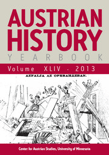
Austrian History Yearbook
Exploring the Depths of Austrian HeritageAustrian History Yearbook is a leading academic journal published by Cambridge University Press, focusing on the rich tapestry of Austrian history and its intersections with broader European narratives. With its ISSN 0067-2378 and E-ISSN 1558-5255, the journal has carved a niche within the academic landscape since its inception, offering insightful research and analysis that spans various periods and themes in Austrian history. Rated in the Q2 category for History in 2023, and boasting a respectable Scopus rank of #564 out of 1760 within the Arts and Humanities field, the Austrian History Yearbook stands out as a vital resource for historians, researchers, and students alike. The journal aims to promote scholarly discourse, foster critical engagement with historical texts, and contribute significantly to the historiography of Austria and its role in European history. With access options providing a gateway to an extensive repository of scholarly works, the journal serves as an essential platform for advances in historical research, making it indispensable for a global audience keen on understanding the complexities of Austrian heritage.

Revue LISA-LISA E-Journal
Fostering innovative research in an open-access academic community.Revue LISA-LISA E-Journal is a prominent academic journal published by the Université de Caen, Maison Recherche & Sciences Humaines, dedicated to advancing knowledge in the field of humanities and social sciences. Since its inception in 2003, this Open Access journal has provided a valuable platform for researchers, professionals, and students to disseminate their findings and engage in scholarly discourse without barriers. With its ISSN 1762-6153 and an extensive array of interdisciplinary topics, Revue LISA serves as a significant resource for those interested in understanding the complexities of contemporary issues through a critical and analytical lens. The journal encourages submissions that reflect innovative research and diverse perspectives, fostering a vibrant academic community dedicated to the exploration of human experiences and societal dynamics.
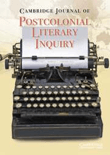
Cambridge Journal of Postcolonial Literary Inquiry
Shaping the future of postcolonial literary inquiry.Welcome to the Cambridge Journal of Postcolonial Literary Inquiry, a leading academic journal published by Cambridge University Press, dedicated to exploring the intricate intersections of postcolonial studies, literature, and history. With its ISSN 2052-2614 and E-ISSN 2052-2622, this journal has emerged as a vital resource for researchers, professionals, and students interested in the evolving narratives and theoretical frameworks shaped by postcolonial contexts. Operating since 2014 and spanning until 2024, it holds a commendable position in the academic community, reflected in its Scopus rankings, including a 76th percentile in Literature and Literary Theory. While the journal does not provide open access options at this time, it offers comprehensive insights that contribute significantly to the discourse surrounding cultural studies and historical perspectives. With categories in the Q3 and Q2 quartiles for Cultural Studies and Literature, it remains a crucial space for innovative scholarship, fostering intellectual engagement with the themes of identity, power, and resistance represented in postcolonial literature.
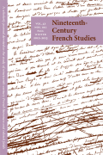
NINETEENTH-CENTURY FRENCH STUDIES
Connecting Scholars Through French Literary DiscourseNINETEENTH-CENTURY FRENCH STUDIES, published by University of Nebraska Press, is a premier academic journal dedicated to the exploration and analysis of French literature and culture from the 19th century. Established as a vital resource for scholars in the field, this journal is recognized for its contribution to literary studies, holding a commendable Q2 rating in the 2023 category of Literature and Literary Theory, reflecting its academic rigor and relevance. With an ISSN of 0146-7891, it offers a platform for innovative research and scholarly discourse, delving into critical topics that shape our understanding of the era. Although it does not currently operate as an open-access journal, its impactful research is instrumental in guiding literary analysis within the arts and humanities. As it continues its publication journey, converging from 2001 to 2024, NINETEENTH-CENTURY FRENCH STUDIES remains essential for researchers, professionals, and students aiming to gain deeper insights into the complexities of 19th-century French literature.

Literatura e Autoritarismo
Engaging with the Voices that Challenge AuthorityLiteratura e Autoritarismo is a leading academic journal dedicated to exploring the intricate relationships between literature and authoritarian regimes. Published by Universidade Federal de Santa Maria, this Open Access journal has been disseminating knowledge since 2003, making significant contributions to the fields of literary studies, political science, and cultural analysis. With an ISSN of 1679-849X, it serves as a vital platform for researchers and students seeking to investigate how literature responds to and shapes authoritarian contexts. The journal's commitment to accessibility ensures that its scholarly articles are freely available to a global audience, fostering diverse scholarly dialogue. Positioned in a critical niche, Literatura e Autoritarismo is dedicated to advancing understanding of how literary discourse can illuminate the complexities of power, resistance, and identity under oppressive regimes, making it an essential resource for those engaged in this vital area of study.